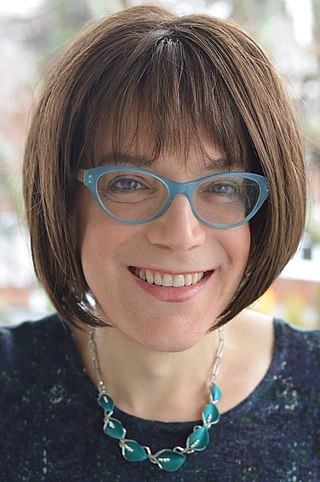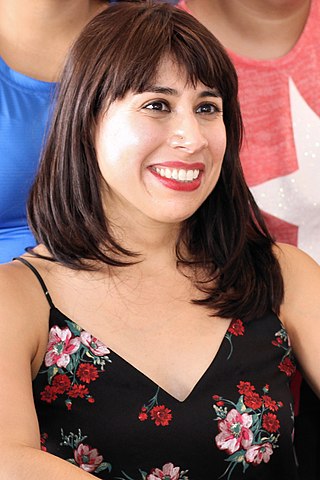Lynda Hull was an American poet. She had published two collections of poetry when she died in a car accident in 1994. A third, The Only World, was published posthumously by her husband, the poet David Wojahn, and was a finalist for the 1994 National Book Critics Circle Award. Collected Poems By Lynda Hull, was published in 2006.
Mary Szybist is an American poet. She won the National Book Award for Poetry for her collection Incarnadine.

Tracy K. Smith is an American poet and educator. She served as the 22nd Poet Laureate of the United States from 2017 to 2019. She has published five collections of poetry, winning the Pulitzer Prize for her 2011 volume Life on Mars. Her memoir, Ordinary Light, was published in 2015.
Kevin D. Prufer is an American poet, novelist, academic, editor, and essayist. He is Professor of English in the Creative Writing Program at the University of Houston.

Tom Sleigh is an American poet, dramatist, essayist and academic, who lives in New York City. He has published nine books of original poetry, one full-length translation of Euripides' Herakles and two books of essays. His most recent books are House of Fact, House of Ruin: Poems and The Land Between Two Rivers: Writing In an Age of Refugees (essays). At least five of his plays have been produced. He has won numerous awards, including the 2008 Kingsley Tufts Poetry Award, worth $100,000, an Academy Award from the American Academy of Arts and Letters, The Shelley Award from the Poetry Society of America, and a Guggenheim Foundation grant. He currently serves as director of Hunter College's Master of Fine Arts (MFA) program in Creative Writing. He is the recipient of the Anna-Maria Kellen Prize and Fellow at the American Academy in Berlin for Fall 2011.

Stephanie Burt is a literary critic and poet who is the Donald P. and Katherine B. Loker Professor of English at Harvard University. The New York Times has called her "one of the most influential poetry critics of [her] generation". Burt grew up around Washington, D.C. She has published various collections of poetry and a large amount of literary criticism and research. Her work has appeared in The New Yorker,The New York Times Book Review, The London Review of Books, and other publications.

Mary Jo Bang is an American poet.

Monica Youngna Youn is an American poet and lawyer.
Anna Leahy is an American poet and nonfiction writer. The author of numerous books of poetry, essays, and creative writing pedagogy, Leahy directs the Tabula Poetica Center for Poetry and MFA in Creative Writing program at Chapman University in Orange, California. In 2013, she was named editor of TAB: The Journal of Poetry & Poetics.

Danez Smith is an American poet, writer and performer from St. Paul, Minnesota. They are queer, non-binary and HIV-positive. They are the author of the poetry collections [insert] Boy and Don't Call Us Dead: Poems, both of which have received multiple awards, and Homie/My Nig. Their most recent poetry collection Bluff was published in 2024.

Erika L. Sánchez is an American poet and writer. She is the author of poetry collection Lessons on Expulsion, a young adult novel I Am Not Your Perfect Mexican Daughter, a 2017 finalist for the National Book Award for Young People's Literature, and Crying in the Bathroom: A Memoir. She was a professor at DePaul University.

Sally Wen Mao is an American poet. She won a 2017 Pushcart Prize.
Donika Kelly is an American poet and academic, who is Assistant Professor of English at the University of Iowa, where she teaches creative writing. She is the author of the chapbook Aviarium, published with fivehundred places in 2017, and the full-length collections Bestiary and The Renunciations.
Diane Seuss is an American poet and educator. Her book frank: sonnets won the Pulitzer Prize for Poetry and the National Book Critics Circle Award for Poetry in 2022.

The Kingdom of Surfaces is a 2023 poetry collection by American poet Sally Wen Mao, published by Graywolf Press. Mao's third poetry collection, it was a finalist for the Maya Angelou Book Award.

Hard Damage is a 2019 debut poetry collection by Aria Aber. It was published by University of Nebraska Press after winning the Prairie Schooner Book Prize in Poetry in 2018. In 2020, Aber received a Whiting Award for the book.

From From is a 2024 poetry collection by Monica Youn, published by Graywolf Press. The book's poems tackle issues of racism faced by Asian Americans and other communities in the United States. Youn's fourth collection, it was nominated for the 2023 National Book Award for Poetry and won the 2024 Anisfield-Wolf Book Award.

As She Appears is a 2022 debut poetry collection by Shelley Wong, published by YesYes Books. It won the 2023 Lambda Literary Award for Lesbian Poetry and was longlisted for the 2022 National Book Award for Poetry.
Shelley Wong is an American poet. In 2022, she released her debut poetry collection, As She Appears, after winning the YesYes Books Pamet River Prize in 2019, and her work has appeared in the Kenyon Review, the New England Review, and other publications. Her poetry has been supported by the Vermont Studio Center, the Headlands Center for the Arts, the Fire Island Artist Residency, the San Francisco Arts Commission, among others.

Don't Call Us Dead is a 2017 poetry collection by Danez Smith, published by Graywolf Press. Smith's second book of poems, it won the Forward Prize for Best Collection and was a finalist for the National Book Award for Poetry.













